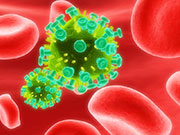
WEDNESDAY, April 8, 2015 (HealthDay News) — Therapy with a human antibody appears to reduce levels of the HIV virus in the blood for at least a month, preliminary research suggests.
Antibodies are the part of the immune system that develop to fight infections. Use of these antibodies as a treatment is called immunotherapy.
The antibody “might be able to intensify current treatment strategies,” said study co-author Dr. Florian Klein an assistant professor of clinical investigation at Rockefeller University in New York City, especially since this new treatment appears to be more potent than previous attempts at HIV immunotherapy.
The researchers acknowledged that this antibody treatment would have to be combined with HIV drugs or another antibody.
And much more research is needed before this treatment could even be used as an add-on therapy. The current study represents just the first level of three phases of research required of drugs before they can be approved in the United States. It’s also possible that more side effects might become evident as more people try the treatment.
So far, researchers haven’t been able to turn immunotherapy into a weapon against HIV — the virus that causes AIDS — although there’s been research into its use both as a treatment and as a vaccine to prevent infection.
In the meantime, another kind of treatment has revolutionized the treatment of HIV over the past 20 years or so: antiretroviral medications. These medications have turned HIV from a fatal diagnosis into a chronic disease. They work by disrupting the machinery that allows the virus to replicate and enter cells.
Antibodies work a bit differently. They “can bind to critical areas on the virus that are required to infect human cells,” Klein explained. “If these sites are blocked by the antibody, the virus cannot infect them. Moreover, antibodies can bind to the virus and engage other immune cells of the patient to eliminate the virus.”
In the new study, researchers turned to an antibody known as 3BNC117 that targets HIV. These type of antibodies are only produced naturally by about 10 percent to 30 percent of people with HIV, according to the researchers.
They injected the immunotherapy into 12 people without HIV and 17 infected people. The participants were almost all men. They were between 22 and 58 years old, and about half were black.
The researchers reported that the levels of virus in infected patients who got the highest doses were “significantly reduced” for 28 days. The study says the treatment was “generally safe and well-tolerated” without serious side effects.
As for cost, Klein acknowledges that antibodies are expensive, although he didn’t estimate its potential cost. The study itself says antibodies cost more than current HIV treatments, although it notes that antibodies last a long time in the body and could potentially be made even more effective.
One potential benefit to this treatment is that it would likely only require an injection every few months. Current HIV treatments have to be taken on a daily basis, the researchers said.
Ralph Pantophlet, an associate professor with the Faculty of Health Sciences at Simon Fraser University in British Columbia, Canada, said the study is important because it confirms the power of antibodies to suppress the virus in the blood. “The side effects seem to be generally minimal and what is likely to be expected from this kind of human antibody,” he said.
As for who might benefit from the treatment, Pantophlet said it may help people who develop resistance to existing antiretroviral drugs. Considering the potential for a higher cost than existing drugs, he said, “I suspect that they will be reserved for select infected individuals and would not be for all HIV-infected individuals.”
What’s next? Klein said studies are in the works to determine if antibodies boost existing treatments and if they can also help patients who aren’t on those drugs.
The study was published April 8 in the journal Nature.
More information
For more about how existing HIV drugs work, try AIDS.gov.
Copyright © 2026 HealthDay. All rights reserved.

